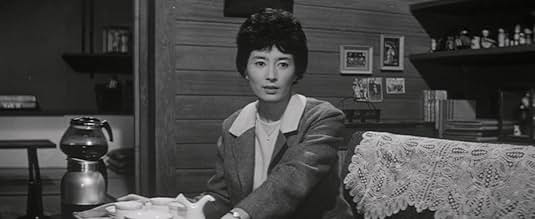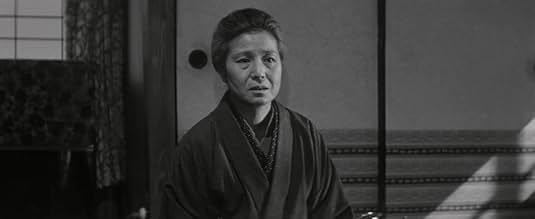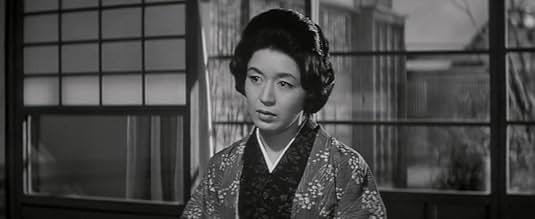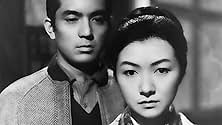IMDb RATING
8.0/10
2.4K
YOUR RATING
After a bombing raid destroys the family store and her husband, Reiko rebuilds and runs the shop out of love stopped short by destruction.After a bombing raid destroys the family store and her husband, Reiko rebuilds and runs the shop out of love stopped short by destruction.After a bombing raid destroys the family store and her husband, Reiko rebuilds and runs the shop out of love stopped short by destruction.
- Director
- Writers
- Stars
- Awards
- 1 win total
- Director
- Writers
- All cast & crew
- Production, box office & more at IMDbPro
8.02.3K
1
2
3
4
5
6
7
8
9
10
Featured reviews
Appreciated more than I enjoyed it
I have all the respect in the world for Mikio Naruse, I really do. His films always touch on things that are still relevant- he's good at exploring timeless themes. His films always have good acting, and are also always nice to look at. They're also tremendously empathetic, and focus far more on female characters than many films from the 1950s and 60s. In that way, they also feel forward-thinking and maybe even radical.
But at the same time, I do always find them slow-going and a little hard to really get into it. There's a certain distance I feel every time I watch one of his movies, even while I recognise they're very well-made. And there's no proper criticisms I can make about it; not more than saying I just find his films a little boring.
It's a me problem. I still respect what he did as a filmmaker, and I do understand why he's so highly regarded. His movies just aren't really for me - not any I've seen yet, at least.
But at the same time, I do always find them slow-going and a little hard to really get into it. There's a certain distance I feel every time I watch one of his movies, even while I recognise they're very well-made. And there's no proper criticisms I can make about it; not more than saying I just find his films a little boring.
It's a me problem. I still respect what he did as a filmmaker, and I do understand why he's so highly regarded. His movies just aren't really for me - not any I've seen yet, at least.
The Missing Father
There are a number of very good reviews here, and so not very much that I can add that hasn't already been said, although I do find the absence of a father figure in this film telling, as it upsets the traditional family balance in a world which is already in flux. One wonders if we aren't to infer that Koji's dissolute lifestyle is a consequence of the war and the loss of his older brother and father. The mother is largely ineffectual, and while Reiko chastens him, it's always mildly maternal and not very effective. I suspect this would have been a salient theme in post war Japan, when so many men failed to return from the war. Reiko, for her part is the only character who really possesses the dignity of character that might have characterized pre-war Japan, helping to explain why the hapless Koji is drawn to her. In a sense, then, she epitomizes the virtues of Japan before the war, cheerfully going about her duties, serving her family without complaint even as most people around her slide into selfishness and desire. That she ultimately gives way to expedience says much about the shifting mores that Japan experienced in the post-war environment. Koji's fate too, seems sealed when at last any chance of being with her disappears. It's interesting that Naruse's last film Floating Clouds revisits some of the same themes of a woman who is emotionally more mature than her suitor, and who likewise walks away. It's a rewarding experience to see both films.
Ideal introduction to Naruse
I've seen most of Naruse's surviving filmography, and out of all those films I would recommend "Midareru" (Yearning, 1964) as an introduction piece for those interested in the director's work. This is because the film features most of the filmmaker's core motifs in a polished, easy-to-follow form, that hooks you in very fast and improves towards the ending.
Naruse's everyday dramas and tales of women living through hard times resemble each other very much, but vary in quality considerably. "Midareru" is one of the director's collaborations with his most-important post-war actress Takamine Hideko. The film craftily builds upon the characters and storylines played by Takamine in previous Naruse films like "Tsuma no kokoro" (A Wife's Heart, 1956), "Onna no za" (The Wiser Age, 1962) and "Onna no rekishi" (A Woman's Place, 1963). In "Midareru", Takamine is again seen as a widow living with his dead husband's family, trying to keep a small family-owned shop going. She is an invaluable member of the household, though people have started to wonder, if she should remarry while she is still young. Takamine has a difficult relationship with his husband's brother Koji (Kayama Yuzo), who lounges through life aimlessly. After a while thing change, and possible romantic sparks occur between them.
Like most Naruse films, "Midareru" operates between the emotional world, and the economical one. The shop is struggling, because a supermarket opened nearby, and the entrepreneurs can't meet their prices. Koji's free-wheeling lifestyle does not help, and Takamine's daily routines take place either in melancholy solitude or interacting with a family, that she is not really a member of. The mundane core of Naruse's work is established well, and yet the ambiguity that makes his works harder to classify than those by his contemporaries is absent in this film. "Midareru" does not rely on the viewer interpreting half of the plot, but is instead straight-forward and well spread as a narrative. This is why I call it a great introduction to the director, whose talent is unquestioned, but whose filmography is full of ups and downs, springs and autumns.
The black and white cinematography is exquisite and captures a detailed vision of everyday life. The narrative carries some worries about the society's state and the rapid westernization, but this is not one of the director's more didactic works. It is very minimalist in the number of important characters, and keeps the bulk of the film close to these individuals. Takamine gives a stunning performance, though it's reserved and classy like her work always is. Kayama manages to turn Koji slowly from a caricature of modernity into a three dimensional individual with a past, a present, and possibly a future. The final act of the film is one of Naruse's best, and the film as whole is that as well.
Naruse's everyday dramas and tales of women living through hard times resemble each other very much, but vary in quality considerably. "Midareru" is one of the director's collaborations with his most-important post-war actress Takamine Hideko. The film craftily builds upon the characters and storylines played by Takamine in previous Naruse films like "Tsuma no kokoro" (A Wife's Heart, 1956), "Onna no za" (The Wiser Age, 1962) and "Onna no rekishi" (A Woman's Place, 1963). In "Midareru", Takamine is again seen as a widow living with his dead husband's family, trying to keep a small family-owned shop going. She is an invaluable member of the household, though people have started to wonder, if she should remarry while she is still young. Takamine has a difficult relationship with his husband's brother Koji (Kayama Yuzo), who lounges through life aimlessly. After a while thing change, and possible romantic sparks occur between them.
Like most Naruse films, "Midareru" operates between the emotional world, and the economical one. The shop is struggling, because a supermarket opened nearby, and the entrepreneurs can't meet their prices. Koji's free-wheeling lifestyle does not help, and Takamine's daily routines take place either in melancholy solitude or interacting with a family, that she is not really a member of. The mundane core of Naruse's work is established well, and yet the ambiguity that makes his works harder to classify than those by his contemporaries is absent in this film. "Midareru" does not rely on the viewer interpreting half of the plot, but is instead straight-forward and well spread as a narrative. This is why I call it a great introduction to the director, whose talent is unquestioned, but whose filmography is full of ups and downs, springs and autumns.
The black and white cinematography is exquisite and captures a detailed vision of everyday life. The narrative carries some worries about the society's state and the rapid westernization, but this is not one of the director's more didactic works. It is very minimalist in the number of important characters, and keeps the bulk of the film close to these individuals. Takamine gives a stunning performance, though it's reserved and classy like her work always is. Kayama manages to turn Koji slowly from a caricature of modernity into a three dimensional individual with a past, a present, and possibly a future. The final act of the film is one of Naruse's best, and the film as whole is that as well.
YEARNING - Incisive drama of postwar Japan from Mikio Naruse
I saw YEARNING (MIDARERU, 1964) at a screening at New York's Asia Society on Dec. 3, 2010. It's only the second film by Mikio Naruse that I've seen, but I'm eager to see more. (The first was WHEN A WOMAN ASCENDS THE STAIRS, 1960, seen on Criterion DVD earlier this year.) YEARNING is a quiet but emotionally honest drama about Reiko, a war widow who has given her best years to her late husband's family, managing their grocery shop while Koji, her younger, handsome brother-in-law, gambles, drinks and loafs. The family plots to tear down the shop and build a supermarket in its place, pushing Reiko out of the top position. Koji protests. When he decides to take a stand, on more than one front, it changes his relationship to Reiko and forces her to make a life-changing decision.
Naruse shoots in a spare, classical style with sync-sound recording, both on location and in the studio, and gets strong performances out of the entire cast. Yuzo Kayama, whom I know primarily from period movies like SANJURO, CHUSHINGURA and SWORD OF DOOM, plays Koji as a spoiled son and brother who begins to mature before our eyes. Hideko Takamine plays the still-beautiful 30-something widow whose self-effacing front hides her own submerged desires. She never acts on her own behalf, but just dutifully runs the shop and waits for Koji to grow up. No matter what is happening in her heart, she simply won't ask for anything or accept it when it's offered. Even when she makes her big move midway through the film, it's only because she thinks it will help Koji. Reiko resembles an Ozu heroine, while Keiko, the lead character in WHEN A WOMAN, also played by Takamine, was more like a Mizoguchi heroine. The film was shot in widescreen black-and-white and the action is set mostly in a small rural town far from Tokyo where a new supermarket loudly promotes itself and its cheaper prices, causing hardship for the small shopkeepers like Reiko. (This is why Koji's family wants to expand the store-to compete.) Later, the film stays with Reiko on a train ride for a long stretch, wrapping up in a small, picturesque resort town.
Mie Hama, the petite beauty who played Kissy Suzuki, the Japanese agent who marries James Bond in YOU ONLY LIVE TWICE (1967), appears in two memorable scenes as Koji's cute and fickle young bedmate who chews gum (and spits it out on the floor of the shop) and boasts a beauty shop hairdo like American teenage girls were wearing at the time. She's quite keyed into her own desires in a way that Reiko can only envy. When she was on screen, I kind of wished the movie would stay with her for a while.
The abrupt ending may leave some viewers unsatisfied. I would have preferred some kind of epilogue, like the final scene of WHEN A WOMAN. However, I've learned to accept that with certain filmmakers like Naruse, one should take the ending on faith, even if you don't get the reason for it right away. YEARNING remains a beautiful, moving Japanese drama with an insistent subtext about the lingering effects of the war on Japanese families some 20 years after the surrender.
Naruse shoots in a spare, classical style with sync-sound recording, both on location and in the studio, and gets strong performances out of the entire cast. Yuzo Kayama, whom I know primarily from period movies like SANJURO, CHUSHINGURA and SWORD OF DOOM, plays Koji as a spoiled son and brother who begins to mature before our eyes. Hideko Takamine plays the still-beautiful 30-something widow whose self-effacing front hides her own submerged desires. She never acts on her own behalf, but just dutifully runs the shop and waits for Koji to grow up. No matter what is happening in her heart, she simply won't ask for anything or accept it when it's offered. Even when she makes her big move midway through the film, it's only because she thinks it will help Koji. Reiko resembles an Ozu heroine, while Keiko, the lead character in WHEN A WOMAN, also played by Takamine, was more like a Mizoguchi heroine. The film was shot in widescreen black-and-white and the action is set mostly in a small rural town far from Tokyo where a new supermarket loudly promotes itself and its cheaper prices, causing hardship for the small shopkeepers like Reiko. (This is why Koji's family wants to expand the store-to compete.) Later, the film stays with Reiko on a train ride for a long stretch, wrapping up in a small, picturesque resort town.
Mie Hama, the petite beauty who played Kissy Suzuki, the Japanese agent who marries James Bond in YOU ONLY LIVE TWICE (1967), appears in two memorable scenes as Koji's cute and fickle young bedmate who chews gum (and spits it out on the floor of the shop) and boasts a beauty shop hairdo like American teenage girls were wearing at the time. She's quite keyed into her own desires in a way that Reiko can only envy. When she was on screen, I kind of wished the movie would stay with her for a while.
The abrupt ending may leave some viewers unsatisfied. I would have preferred some kind of epilogue, like the final scene of WHEN A WOMAN. However, I've learned to accept that with certain filmmakers like Naruse, one should take the ending on faith, even if you don't get the reason for it right away. YEARNING remains a beautiful, moving Japanese drama with an insistent subtext about the lingering effects of the war on Japanese families some 20 years after the surrender.
Takemine is brilliant
The first part of this film makes it look like its main focus is going to be on one of the perils of capitalism, that of large companies driving smaller ones out of business by moving into a neighborhood and undercutting them on prices, kind of like a much more serious version of Supermarket Woman (1996). I thought my review might start with, people, if you value your mom and pop shops, for the of god, stop shopping at Walmart and Amazon. That is certainly a component here, but this film broadens into so much more, dealing with societal expectations for Japanese women and slowly developing an incredibly touching romance.
Hideko Takemine plays Reiko, the widowed daughter-in-law who has been running a grocery store for her in-law family for 18 years, since the end of WWII. She built the store on her own while the rest of the family fled to the countryside to avoid Allied bombing, and lost her beloved husband to the war. A large supermarket moves in and begins taking her shop's business, but worse yet, her sisters-in-law, their husbands, and her mother-in-law have hatched a plan to tear down the grocery and build a supermarket of their own. Despite everything she's done for them, they want her out of the picture, either through re-marriage or relegation to a minor job in the new store.
Resisting this plan is the younger brother (Yuzo Kayama), who was just 7 years old when his brother met Reiko, so perhaps 10-15 years younger than her. (I was surprised this was the actual age difference between Kayama and Takemine, since Takemine at 40 looks so young and is absolutely gorgeous, but I digress.) The younger brother is a bit of a profligate, gambling, sleeping around with women, and staying out to all hours and getting drunk. He stands up for Reiko, and we soon find out that in addition to his sense of fairness, it's because he harbors feelings for her.
Reiko seems like the epitome of ideal womanhood, something which is as limiting as it is unfair. She holds a torch for her late husband with no desire to remarry, and selflessly works away with a smile. She would rather sacrifice her own feelings than complain or cause antagonism. Her emotions are generally well concealed, but Takemine is masterful in revealing them as the story places out. Watch the look of shock and horror on her face when the younger man declares himself, the tears coming to her eyes on the train, or her conflicted look when denying him even after admitting she loves him. She's brilliant.
It seems like it would be the easiest thing in the world for her to be happy in a new marriage, but she's weighted down with feeling a need to stay loyal to her dead husband, what others will think about the age difference, and how she'll be ruining this young guy's promising life. She's a genuinely virtuous person, but I got the sense that she had also internalized too much of the societal expectation to be perfectly selfless. A long, overnight train ride through the country and growing attachment between the pair leads to swirling emotions and unforgettable scenes, played so well by both Takemine and Kayama. Great stuff from Mikio Naruse.
Hideko Takemine plays Reiko, the widowed daughter-in-law who has been running a grocery store for her in-law family for 18 years, since the end of WWII. She built the store on her own while the rest of the family fled to the countryside to avoid Allied bombing, and lost her beloved husband to the war. A large supermarket moves in and begins taking her shop's business, but worse yet, her sisters-in-law, their husbands, and her mother-in-law have hatched a plan to tear down the grocery and build a supermarket of their own. Despite everything she's done for them, they want her out of the picture, either through re-marriage or relegation to a minor job in the new store.
Resisting this plan is the younger brother (Yuzo Kayama), who was just 7 years old when his brother met Reiko, so perhaps 10-15 years younger than her. (I was surprised this was the actual age difference between Kayama and Takemine, since Takemine at 40 looks so young and is absolutely gorgeous, but I digress.) The younger brother is a bit of a profligate, gambling, sleeping around with women, and staying out to all hours and getting drunk. He stands up for Reiko, and we soon find out that in addition to his sense of fairness, it's because he harbors feelings for her.
Reiko seems like the epitome of ideal womanhood, something which is as limiting as it is unfair. She holds a torch for her late husband with no desire to remarry, and selflessly works away with a smile. She would rather sacrifice her own feelings than complain or cause antagonism. Her emotions are generally well concealed, but Takemine is masterful in revealing them as the story places out. Watch the look of shock and horror on her face when the younger man declares himself, the tears coming to her eyes on the train, or her conflicted look when denying him even after admitting she loves him. She's brilliant.
It seems like it would be the easiest thing in the world for her to be happy in a new marriage, but she's weighted down with feeling a need to stay loyal to her dead husband, what others will think about the age difference, and how she'll be ruining this young guy's promising life. She's a genuinely virtuous person, but I got the sense that she had also internalized too much of the societal expectation to be perfectly selfless. A long, overnight train ride through the country and growing attachment between the pair leads to swirling emotions and unforgettable scenes, played so well by both Takemine and Kayama. Great stuff from Mikio Naruse.
- How long is Yearning?Powered by Alexa
Details
- Release date
- Country of origin
- Language
- Also known as
- Tormento (Midareru)
- Production company
- See more company credits at IMDbPro
- Runtime
- 1h 38m(98 min)
- Color
- Sound mix
- Aspect ratio
- 2.35 : 1
Contribute to this page
Suggest an edit or add missing content

![Watch Trailer [OV]](https://m.media-amazon.com/images/M/MV5BZGVlZTIxNDUtMjg2NC00Y2VkLTg3MWEtYzZlMmRkNmQ3MmNlXkEyXkFqcGdeQXRyYW5zY29kZS13b3JrZmxvdw@@._V1_QL75_UY281_CR2)
































